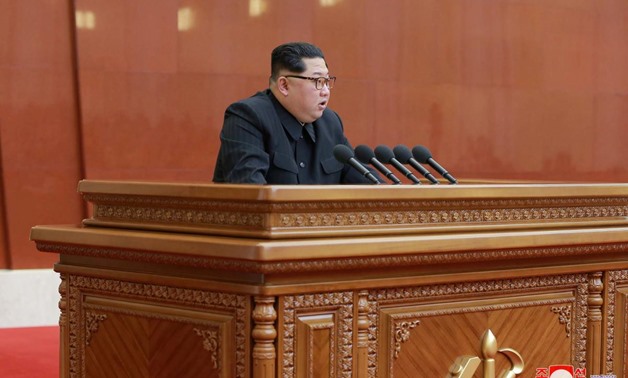
North Korean leader Kim Jong Un speaks during the Third Plenary Meeting of the Seventh Central Committee of the Workers' Party of Korea (WPK), in this photo released by North Korea's Korean Central News Agency (KCNA) in Pyongyang on April 20, 2018. KCNA/v
SEOUL - 21 April 2018: North Korea said on Saturday it would immediately suspend nuclear and missile tests, scrap its nuclear test site and instead pursue economic growth and peace, ahead of planned summits with South Korea and the United States.
North Korean leader Kim Jong Un said his country no longer needed to conduct nuclear tests or intercontinental ballistic missile tests because it had completed its goal of developing the weapons, the state-run Korean Central News Agency (KCNA) said.
Kim is scheduled to hold talks with South Korean President Moon Jae-in next week and with U.S. President Donald Trump in late May or early June.
The pledge to halt the development of nuclear weapons, initiated by his grandfather, would mean a significant reversal for Kim, 34, who for years has celebrated such weapons as a pillar of his regime’s legitimacy and power.
A testing freeze and commitment to close the test site alone would fall short of Washington's demand that Pyongyang completely dismantle all its nuclear weapons and missiles.
But announcing the concessions now, rather than during summit meetings, shows Kim is serious about denuclearisation talks, experts say.
"The northern nuclear test ground of the DPRK will be dismantled to transparently guarantee the discontinuance of the nuclear test," KCNA said after Kim convened a plenary session of the Central Committee of the ruling Worker's Party on Friday.
The North's official name is the Democratic People's Republic of Korea (DPRK).
The Pyunggye-ri site is North Korea's only known nuclear test site. All of its six underground tests were conducted there, including the last and largest in September.
APPLAUSE FROM TRUMP
Trump welcomed the statement and said he looked forward to a summit with Kim.
"North Korea has agreed to suspend all Nuclear Tests and close up a major test site. This is very good news for North Korea and the World - big progress! Look forward to our Summit," Trump said on Twitter.
South Korea said the North's decision signified "meaningful" progress toward denuclearisation of the peninsula and would create favourable conditions for successful meetings with it and with the United States.
China, North Korea's sole major ally, has been frustrated by its defiant development of weapons and welcomed the announcement, saying it would ease tension and promote denuclearisation.
"The Chinese side believes that North Korea's decision will help ameliorate the situation on the peninsula," a foreign ministry spokesman, Lu Kang, said in a statement.
The Russian Foreign Ministry said it welcomed the announcement by North Korea and called on the United States and South Korea to reduce their military activity in the region.
Japanese Prime Minister Shinzo Abe also welcomed the North Korean statement but said it must lead to action.
"What's important is that this leads to complete, verifiable denuclearisation. I want to emphasise this," Abe told reporters.
Australia and Britain were also cautious.
The British government said in a statement that Pyongyang's commitment was a positive step and hoped it indicated "an effort to negotiate in good faith".
Australian Foreign Minister Julie Bishop said "verifiable steps" would be needed to ensure testing had indeed been halted.
The European Union's foreign affairs chief Federica Mogherini said North Korea's move was a positive step and called for an "irreversible denuclearisation" of the country.
German Foreign Minister Heiko Maas said North Korea's announcement was a step in the right direction but it must "disclose its complete nuclear and missile programme in a verifiable way".
EVIDENCE
"We're all looking for evidence that Kim is really serious about negotiations, and announcements like this certainly suggest he is, and that he is trying to make clear to the world that he is," said David Wright, co-director of the Global Security Program at the Union of Concerned Scientists.
North Korea has said its nuclear and missile programmes are necessary deterrents against U.S. hostility. It has conducted missile tests with the aim of being able to hit the United States with a nuclear bomb.
The tests and escalating angry rhetoric by Trump and Kim raised fears of war until, in a New Year's speech, the North Korean leader called for a reduction in military tensions.
He sent a delegation to the Winter Olympics in the South in February, leading to a thaw in relations with his old enemies.
Nam Sung-wook, professor of North Korean Studies at Korea University in Seoul, said it was "sensational" that Kim had personally declared plans to suspend nuclear development, but added that his remarks left questions.
"It still does not seem clear if it means whether the North will just not pursue further development of its nuclear programmes in the future, or whether they will completely shut down 'all' nuclear facilities. And what are they going to do with their existing nuclear weapons?" Nam said.
Many U.S. officials and experts doubt Kim's sincerity about denuclearising, viewing the recent flurry of diplomacy as a ploy to win relief from economic sanctions.
U.N. Security Council sanctions imposed on North Korea after its first nuclear test in 2006 and extended over the past decade have banned critical exports such as coal, iron ore, seafood and textiles while limiting oil imports.
That has threatened the policy of "byungjin" - simultaneous military and economic development - that Kim has adopted since taking power in 2011.
Koh Yu-hwan, professor of North Korean Studies at Dongguk University in Seoul, said he did not believe Pyongyang was ready to give up its nuclear weapons.
"Kim is just saying that now that the nuclear development is complete, he will put all the efforts toward building an economy," Koh said.


Comments
Leave a Comment